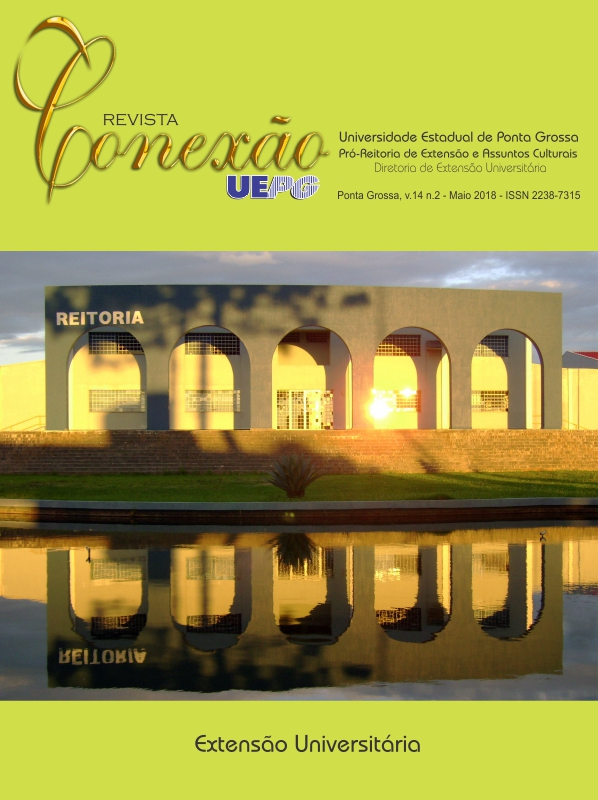YOUTH AND ADULT EDUCATION EXTENSION COURSE: DIALOGUES BETWEEN YOUTH, UNIVERSITY AND SCHOOL
DOI:
https://doi.org/10.5212/Rev.Conexao.v.14.i2.0019Keywords:
Youth, University Extension, Teacher qualification, Basic education.Abstract
This paper reports on the experience of the extension course "Youth and Adult Education (EJA) for Youth", conducted in the blended mode, aimed at teachers of basic education who worked in the Urban ProJovem program in several states of the country. The main objective is to reflect on a moment of university policies in which the university extension guidelines have moved closer to the public policies of inclusion of the youth, through a greater dialogue with the youth. It emphasizes the contribution of the extension field to teachers’ initial education, mainly through dialogue methodologies. It reflects on the challenges of developing distance extension projects, along with the importance of mediation by the young people themselves, undergraduate students and social activists, in a process of intergenerational educational qualification. It points out the negative impacts that the discontinuation of teacher education policies generates in terms of the effectiveness of inclusion processes.
Downloads
References
ABRAMO, H.W.; BRANCO, P.P.M. (org.). Retratos da Juventude Brasileira. Análises de uma Pesquisa Nacional. São Paulo: Instituto Cidadania/Editora Fundação Perseu Abramo, 2005.
ANDRADE, E.R.; ESTEVES, L.C.G.; CASTRO, E. Composição social e percursos escolares dos sujeitos do ProJovem: novos/velhos desafios para o campo da Educação de Jovens e Adultos. Brasília: Em Aberto, v. 82, p. 73-89, 2009.
BRASIL. Presidência da República. Estatuto da Criança e do Adolescente. Lei nº 8.069 de 13 de julho de 1990. Disponível em <http://www.planalto.gov.br/Ccivil_03/leis/L8069.htm> Acesso em: 31 jan. 2018.
BRASIL. Ministério da Educação. Conselho Nacional de Educação. Parecer CNE/CEB, nº 18 Apreciação do Projeto Pedagógico Integrado e autorização de funcionamento do ProJovem Urbano, homologado em 06 de agosto de 2008. Disponível em < http://portal.mec.gov.br/index.php?option=com_docman&view=download&alias=9903-projovem-urbano-parecer-18-2008&category_slug=fevereiro-2012-pdf&Itemid=30192> Acesso em: 30 jan. 2018.
BRASIL. Ministério da Educação. Fundo Nacional de Desenvolvimento da Educação. RENAFOR. Resolução nº 24, de 16 de agosto de 2010.
BRASIL. Estatuto da Juventude. Lei Nº 12.852, de O5 de agosto de 2013. Disponível em <http://www.planalto.gov.br/ccivil_03/_Ato2011-2014/2013/Lei/L12852.htm> Acesso em: 30 jan. 2018.
CASARA, Rubens. Estado Pós-Democrático: Neo-obscurantismo e Gestão dos Indesejáveis. Rio de Janeiro: Civilização Brasileira, 2018.
DRAIBE, Sônia. A política social no período FHC e o sistema de proteção social. São Paulo: Revista Tempo Social, v.15, n.2, nov. 2003.
FORPROEX. XXXIII Encontro Nacional do Forproex - Carta do Rio de Janeiro 14/05/2013. RENEX. Rede Nacional de Extensão. Disponível em https://www.ufmg.br/proex/renex/index.php/noticias/67-xxxiii-encontro-nacional-do-forproex-carta-do-rio-de-janeiro Acesso em: 31 Jan., 2018.
FREIRE, Paulo. Pedagogia da Esperança. Um Reencontro com a Pedagogia do Oprimido. Rio de Janeiro: Paz e Terra, 1992.
GATTI, Bernadete A. Educação, escola e formação de professores: políticas e impasses. Educar em Revista, Curitiba, Brasil, n. 50, p. 51-67, out./dez. 2013. Editora UFPR.
NEUMANN, Zilda Arns. Conhecimento e solidariedade que geram inclusão social. O caso da Pastoral da Criança. Brasília: Revista Inclusão Social, v.1, n.2, p. 88-91, abr./set. 2006.
NOVAES, Regina. Os jovens de hoje: contextos, diferenças e trajetórias. In: ALMEIDA, M.I.M.; EUGÊNIO, F. Culturas Jovens: Novos Mapas do Afeto. p. 105-120. Rio de Janeiro: Jorge Zahar, 2006.
NOVAES, Regina; VENTURA, Gustavo; RIBEIRO, Eliane; PINHEIRO, Diógenes. Agenda Juventude Brasil. Leituras sobre uma década de mudanças. Rio de Janeiro: Editora UNIRIO, 2016.
RUA, Maria das Graças. As políticas públicas e a juventude dos anos 90. In: CNPD Jovens Acontecendo nas Trilhas das Políticas Públicas. Brasília: CNPD, 1998.
SANTOS, Wanderley Guilherme. A Democracia Impedida. O Brasil no Século XXI. Rio de Janeiro: Editora FGV, 2017.
SECADI/MEC. Educadores do ProJovem Urbano: Opiniões, Avaliações e Expectativas. Relatório de Acompanhamento. Brasília: SECADI/MEC, 2010.
TAVARES, Maria da Conceição. “PEC 241 é um suicídio programado", diz Maria da Conceição Tavares. Economista diz que medida vai contra preceitos do próprio FMI. Jornal do Brasil, Rio de Janeiro, 2018, disponível em <http://www.jb.com.br/pais/noticias/2016/10/13/pec-241-e-um-suicidio-programado-diz-maria-da-conceicao-tavares/> Acesso em: 31 jan. 2018.
VELHO, Gilberto. Projeto e Metamorfose: Antropologia das Sociedades Complexas. 3.ed. Rio de Janeiro: Jorge Zahar Editora, 2003.
VENTURA, Zuenir. 1968: O Ano que Não Terminou. Rio de Janeiro: Nova Fronteira, 1988.
WAISELFISZ, Jacobo. Mapa da Violência Contra os Jovens do Brasil. Rio de Janeiro: Garamond, 1998.
Downloads
Published
Issue
Section
License
a) Authors retain copyright and grant the journal right of first publication with the work simultaneously licensed under a Creative Commons Attribution License that allows others to share the work with an acknowledgement of the work's authorship and initial publication in this journal.
b) By submitting an article to the Revista Conexão UEPG and having it approved, the authors agree to assign, without compensation, the following rights to the Journal: the rights of first publication and the rights to redistribute the article and its metadata to the indexing and reference services that the editors deem appropriate.
c) Readers are free to transfer, print out and use the articles published in the Journal, as long as there is always explicit mention to the author(s) and to the Revista Conexão UEPG and as long as there is no alteration of the original work. Any other use of the texts needs to be approved by the author(s) and by the Journal.






